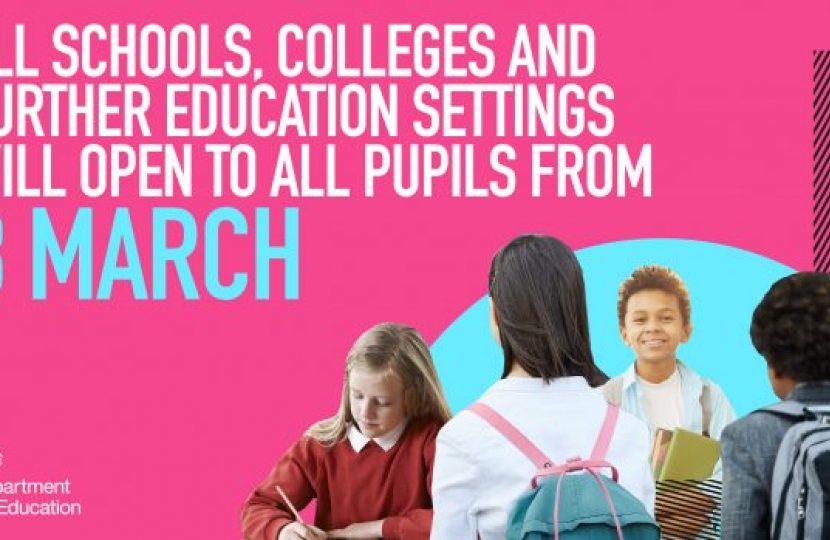
Primary school children, secondary school pupils and college students as well as university students on practical courses who need access to specialist facilities and equipment will all return to school, college or university on Monday 8th March. This will be supported with a new £700 million plan to help young people in England catch up on lost learning due to the pandemic.
From Monday 8 March, schools and colleges will open to all pupils with asymptomatic COVID-19 testing in place.
The return of all pupils is a priority in the Government’s roadmap for the easing of restrictions due to the significant and proven impact to the mental and physical health and wellbeing of children and young people kept out of school.
The government continues to take the safety of all students and education staff extremely seriously, the guidance for all education settings has been based on the best medical advice.
The government has also published an evidence summary which sets out the evidence relevant to, and in support of, the Government’s decision to lift restrictions on education from 8 March 2021 – link available here.
While Public Health England continues to advise that the existing range of safety measures in place in education settings remains appropriate, the government has strengthened existing protective measures in schools, colleges and universities, including:
- a requirement for all adults and students in year 7 and above to wear face coverings in all indoor settings including classrooms as a temporary precaution;
- all secondary school and college students taking three COVID-19 tests when they return to the classroom on the 8 March at existing school testing facilities;
- further provision of two rapid tests to use each week at home.
Schools and colleges will have discretion on how to stagger the return of their students over the first week to allow them to be tested on return. In general, however, school attendance will be mandatory for all pupils from 8 March. The usual rules on school attendance apply.
Early years & childcare
Early years settings will continue to be open to all children, as they have throughout the period of national restrictions.
Wraparound childcare, including childminders, should also allow attendance from 8 March to enable parents to work, seek work, attend education, seek medical care or attend a support group. Vulnerable children may attend these settings regardless of circumstance. From 29 March, all children will be able to access any outdoor childcare or supervised activities.
Scientific guidance
Evidence from the Public Health England-led Schools Infection Study continues to show that infection rates in schools mirror infection rates in the wider community, suggesting schools are not the main driver of infections.
The Schools Infection Study (SIS) by PHE, ONS and LSHTM also showed that COVID-19 infection rates in schools among staff and pupils mirrored infection rates in the wider community.
PHE’s Surveillance in Schools study (sKIDS) suggests that transmission in primary schools is extremely low and outbreaks are rare.
The consensus view from SAGE continues to be that missing out on classroom-based education has severe impacts for children and young people, with clear evidence that further time out of schools and colleges is detrimental for cognitive and academic development, learning, health and wellbeing.
Future changes
The Government will review the options for the timing of the return of remaining university students by the end of the Easter holidays. This review will take account of the latest data and will be a key part of the wider roadmap steps. Students and providers will be given a week’s notice ahead of any further return.
Catch Up funding
The government has committed to helping children and young people recover learning lost as a result of the pandemic. It is working in collaboration with the education sector to develop specific initiatives for summer schools and a Covid Premium as well as a long-term plan to make sure children and young people have the chance to make up their learning.
In June 2020 the government announced a catch-up package worth £1 billion, including a ‘Catch Up Premium’ worth a total of £650m to support all schools to make up for lost teaching time and £350m for the National Tutoring Programme to help disadvantaged pupils to catch-up on lost learning.
The return of children and students will be supported with a new £700 million package, focusing on an expansion of one-to-one and small group tutoring programmes, as well as supporting the development of disadvantaged children in early years settings, and summer provision for those pupils who need it the most.
A new one-off Recovery Premium for state primary and secondary schools, building on the Pupil Premium, will be provided to schools to use as they see best to support disadvantaged students.
The new recovery package for England includes:
-
A new one-off £302 million Recovery Premium for state primary and secondary schools, building on the Pupil Premium, to further support pupils who need it most. The average primary school will receive around £6,000 extra, and the average secondary school around £22,000 extra. This will help schools to bolster summer provision for their students, for example laying on additional clubs and activities, or for evidence-based approaches for supporting the most disadvantaged pupils from September.
-
£200 million (from the £300 million announced by the Prime Minister in January to expand our successful tutoring programmes). This will fund an £83 million expansion of the National Tutoring Programme for primary and secondary schools, which has been shown to boost catch up learning by much as 3-5 months at a time; a £102 million extension of the 16-19 Tuition Fund for a further year to support more students in English, maths and other vocational and academic subjects; and £18 million funding to support language development in the early years, supporting a critical stage of child development.
-
£200 million (including the final £100 million from the Prime Minister’s announcement) will be available to secondary schools to deliver face-to-face summer schools. Schools will be able to target provision based on pupils’ needs but the government is suggesting they may want to initially target incoming year 7 pupils. This is alongside wider support funded through our Holiday Activities and Food Programme across the country.
-
A range of high-quality online resources will be available for all teachers and pupils, starting from the summer term and throughout summer holidays. These will be provided by Oak National Academy, to help give pupils the confidence they are ready for the next academic year.
Guidance updates
The government continue to provide the sector with guidance and support during the period of national lockdown.
For information, links to the published guidance are provided below:

